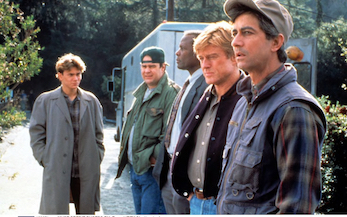The Number One Movie in America: Sneakers
By Sean Collier
November 22, 2020
Sometimes, you can have all the talent in the world, a good concept and all the other secret ingredients, and the result is ... fine. As any number of Oscar-hopeful prestige pics and star-studded extravaganzas have discovered, there’s no formula for critical acclaim — or box-office success.
Witness, for example, “Sneakers,” the 1992 heist caper starring Robert Redford. Three Oscar winners (Redford, Sidney Poitier and Ben Kingsley) appear alongside another five Oscar nominees (River Phoenix, David Straithairn, Dan Aykroyd, Mary McDonnell and James Earl Jones). The story, blending early-internet hacker intrigue and post-Cold War spycraft, is a rich setting. The comic timing is spot-on. The director, Phil Alden Robinson, was coming off of the immensely satisfying “Field of Dreams” a few years prior.
All the right stuff is in the mix, and the result is ... pretty good. It’s better than fine.
You can’t point at anything that’s really wrong with “Sneakers.” There are elements that don’t work, like Dan Aykroyd trying to keep up with Sidney Poitier, who is dramatically out of the younger actor’s league in every regard. Some scenes slightly miss the mark; a culminating moment that requires Redford to move very, very slowly in a tense situation goes for awkward-funny, but comes off as goofy.
But these are minor complaints. It’s a good movie. Redford is very funny and leads with ease. Most of the bits work. It’s compelling enough. The big twist is plausible (never a guarantee in a heist movie).
It’s good. At times, it’s very good. It’s just not great — and it constantly feels like it should be.
If the box office is any indication, moviegoers felt much the same way: “Sneakers” did well, but not spectacularly. The film was released on September 11, 1992, easily winning a sleepy weekend with a hair over $10 million; the closest thing to competition was the release of “Hellraiser III: Hell on Earth,” which stumbled to a third-place finish. “Sneakers” did repeat at number one, edging a quartet of underwhelming newcomers — “Captain Ron,” “School Ties,” “Husbands and Wives” and “Singles” — the following weekend, but the returns diminished as the autumn wore on. The film amassed an unspectacular total of $51.2 million, good for 30th on the year-end chart.
While the film, like a great many ’90s flicks that faced ho-hum returns on initial release, did amass a wider following via frequent cable-television airings, it counts as something of a hidden gem today. In that setting, it’s much more comfortable; approaching “Sneakers” without expectation is likely a better approach than reckoning with it in advance.
Without much anticipation, it’s a parade of stellar performances and charming scenes. Strathairn gives a great performance, standing out from the pack. Stephen Tobolowsky (better known as Ned Ryerson) hits a home run with a smaller role. Poitier, obviously, is perfect — in his next-to-last big-screen role to date. A bit of Phoenix’s charm shines through in an underwritten role.
There’s plenty to like about “Sneakers.” There’s just a little less than you might expect.
“Sneakers” is the subject of the latest episode of The Number One Movie in America, a look back at past box-office champions. Each episode’s film is drawn at random from a list of every number-one movie since 1977. Please listen and subscribe!
Next time: “Boy. When Marge first told me she was going to the police academy, I thought it would be fun and exciting! Like that movie — Spaceballs! But instead, it’s been painful and disturbing, like that movie Police Academy.”
|
|
|
|




